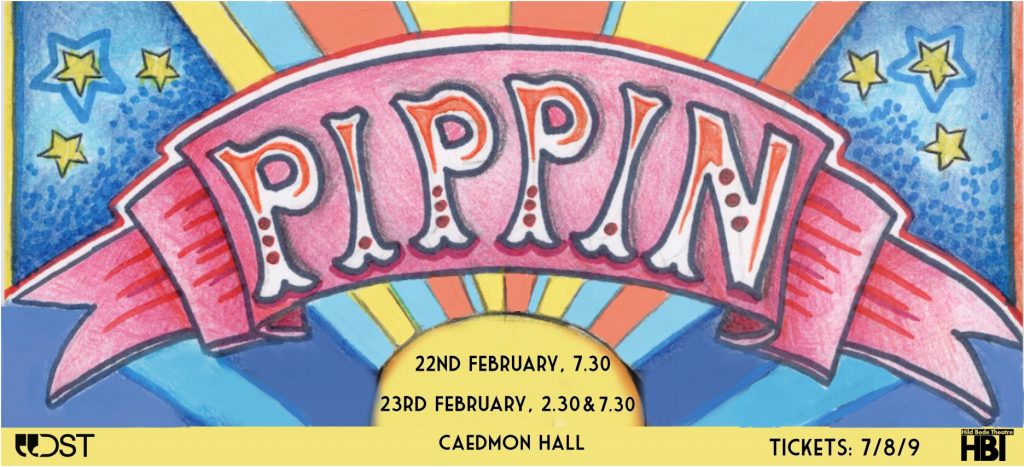
Poster: Hild Bede Theatre
A soul-searching exploration of one person’s journey to find their place and purpose in life, Pippin is a musical about an ordinary person on an extraordinary journey.
While the above plot summary is certainly true, it truly does not do justice to the sheer amount of twists and surprises in store for the viewer. Ostensibly about the search for meaning of Pippin, son of historical figure King Charlemagne, the play opens up to wider considerations of power in society, the nature of fame, deconstructions of destiny narratives, and even a critical and provocative approach to the very nature playwriting itself.
The above list makes the play sound far weightier than it is. In fact, the play’s tone is of a deft, energetic humour, which opens up to subtle criticism nearer the end. It strikes at the start a tone of self-importance and grandiosity, embodied and created mostly by the Leading Player, played by Isabel Raby. Raby here does an excellent job here with what is undoubtedly a tough role; she has to function as narrator, presenter, and circus-master all at once, and yet she maintains the energy, sass, and charisma necessary for such a demanding part.
When it comes to maintaining energy, it’s crucial also to give major credit to director Courtney Power and co-director and assistant choreographer Gabbie Sills, both of whom have worked deftly in conjunction to create a musical with real life and energy. Particularly impressive to me were the efforts they made in encouraging audience participation, with characters cajoling audience members to join in with the singing, and variously addressing them during the songs. Not only did this spread the warmth of the play through the room, but it also had the majorly important function of managing the sinister, metafictional turn the play takes at the end.
This metafictional examination of theatre was a fantastically interesting part of it, and was consistently pointed to through the frequent meta-jokes which recurred throughout. The protagonist Pippin is played by Charlie Nicholson, who strikes an awkward and uncertain figure in his excellent portrayal of a lost soul in search of meaning during a quarter-life crisis. In this way, the play felt impressively modern. Authoritarian directors are frequently encountered by Pippin, namely the aforementioned Leading Player, but also Pippin’s own father, Charlemagne, played by Francesca Davies-Cáceres. Charlemagne is the figure of orthodoxy, attempting to guide his son to be a servant to power under the guise of benevolence. Davies-Cáceres’ interpretation of Charlemagne as a bored and subtly cruel monarch tied in excellently with the play’s anti-war themes. These themes were excellently captured in particular in the choreography of ‘War is a Science’, which excellently brought out the contrast between Charlemagne and Pippin and the latter’s complete unfitness for war.
Needless to say, the musicians were also excellent. In an interesting twist they were placed onstage, which worked excellently for the twist of the finale, but also meant that they were able to be better heard by the audience, taking full advantage of the theatre’s acoustics. However, their clarity may have been too great at points: occasionally, and particularly in the opening number, the voices of the actors were drowned out by the sheer loudness of the orchestra. Of course, this is only a minor blemish in what is otherwise an incredibly successful musical.
Between Jesus Christ Superstar and Pippin, there appears to be something of a big, sellout musical craze in Durham. After viewing Pippin, I can safely say that this is a really good sign for Durham’s theatre scene; if every subsequent musical excels as much as this one in every regard, we’re in for a real treat. I highly recommend this excellent production to both musical theatre nuts, casual theatregoers, and anyone else.
Hild Bede Theatre’s Pippin is on 22nd February at 7:30pm and 23rd February at 2:30pm and 7:30pm in Caedmon Hall.